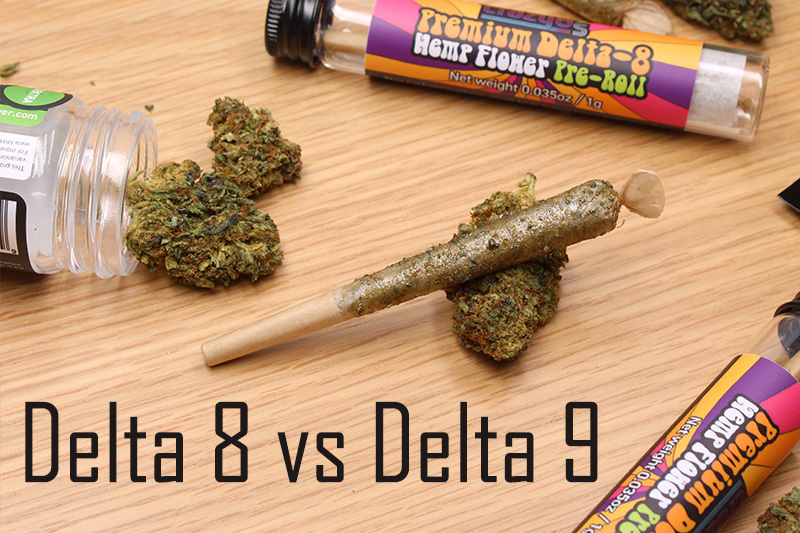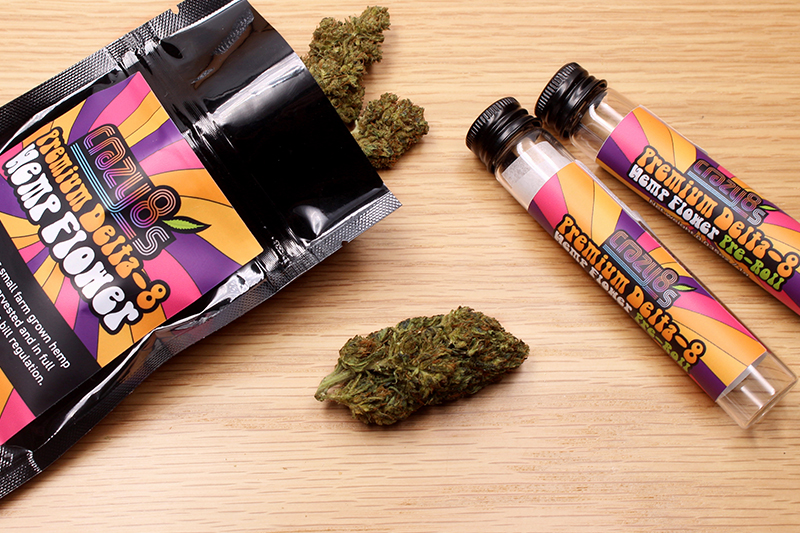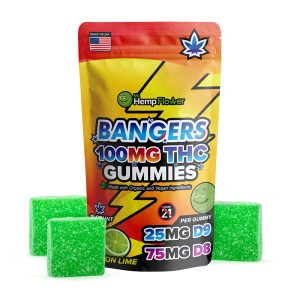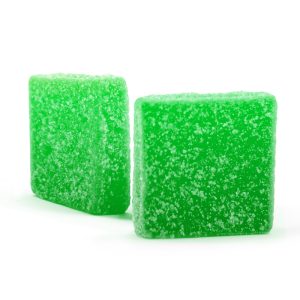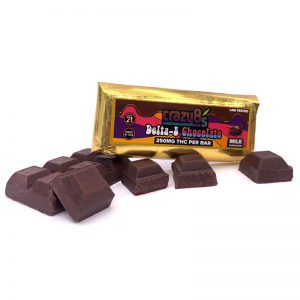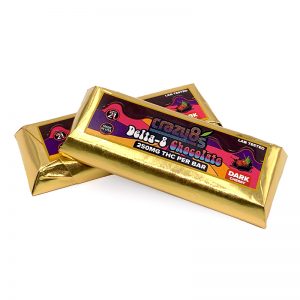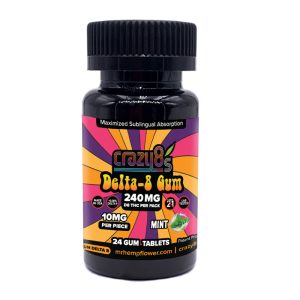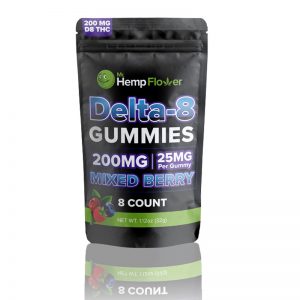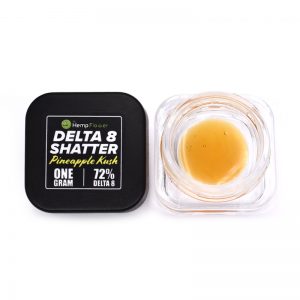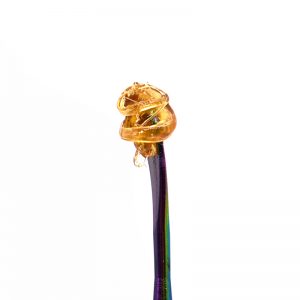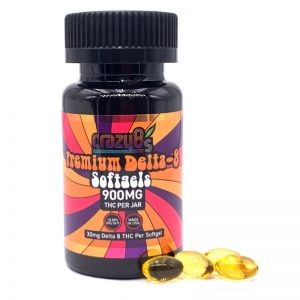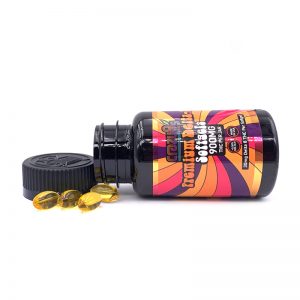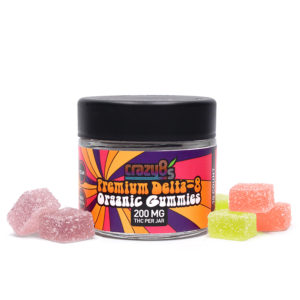Delta 8 THC or delta 9 THC, which to choose?
These two THC isomers are very similar but different at the same time. If you need help choosing between delta 8 and delta 9 THC, this article is for you.
It covers key differences and similarities in potency, chemical structure, and therapeutic effects between delta 9 and delta 8.
Last Update: July 26, 2023
Article Summary
- Delta 8 THC and delta 9 THC are organic compounds, cannabinoids, produced naturally in the hemp plant. They share a very similar structure but differ in potency, psychoactive effects, and how they are produced in the plant.
- Both delta 8 and delta 9 interact with the endocannabinoid system (ECS), binding with the CB1 receptor in the central nervous system. However, delta 9 has a greater binding affinity to the CB1 receptor due to differences in their structure, hence producing a stronger psychoactive effect.
- Delta 8 has milder effects compared to delta 9 and is a popular choice among medical cannabis patients looking for therapeutic benefits without the heavy psychoactive effects.
- Delta 9 THC exhibits more severe adverse effects and can exacerbate anxious and depressive thoughts and feelings due to its potency.
- Despite being different in terms of their potency and effects, it’s possible to mix delta 8 and delta 9 THC. But be cautious, as high doses can be overwhelming.
- Hemp-derived delta 9 THC is legal at the federal and state levels if present in a concentration of no more than 0.3%. The legal status of delta 8 THC is complicated as this compound is banned in several states.

What is Delta 8 THC?
Delta 8 THC, a minor phytocannabinoid, constitutes approximately 0.01% of the hemp plant. Due to its minimal presence, it’s typically extracted and concentrated into various forms such as tinctures, oils, sprays, and edibles for easy consumption.
Scientists discovered this phytocannabinoid in the early 1970s. Since then, numerous clinical tests have been conducted to understand its psychoactivity and potency.
Delta 8 THC is an analog of tetrahydrocannabinol (THC), and it’s known for its potential medical applications. While it has psychoactive properties, its intensity is significantly lower than delta 9 THC.
What is Delta 9 THC?
Delta 9 tetrahydrocannabinol, commonly known as THC, is the most well-known molecule in cannabis.
It’s recognized for its potent therapeutic effects and ability to induce a “high.” This psychoactive compound is the primary reason behind the global restrictions on cannabis.
Despite its recreational use, THC also has several medicinal applications. It can be consumed through smoking, edibles, sprays, or topical applications.
The hemp plant contains less than 0.3% THC, while certain strains of the marijuana plant can contain up to 30% THC. Concentrates and extracts like hashish can have more than 50% delta 9 THC.
Read more: Why Are People Switching to Delta 8 THC from Delta 9 THC?
Delta 8 vs. Delta 9: Key Differences and Similarities
Chemically, delta 8 and delta 9 are very similar, but even the slightest differences in their structure bring diverse effects.
Delta 8 vs. Delta 9: Are They Natural?
Yes, delta 8 and delta 9 THC are organic compounds, or cannabinoids, naturally produced in the cannabis plant.
The cannabis plant (hemp and marijuana) uses similar pathways to create these two compounds.
Delta 8 THC is naturally produced in hemp through the biosynthesis of cannabinoids in trace amounts (less than 0.1%). In fact, delta 8 THC comes from delta 9 THC.
The biosynthesis of hemp cannabinoids is an interconnected process where each cannabinoid has a special role in the creation of other cannabinoids.
For THC, it all starts with an enzyme-fueled conversion of cannabigerolic acid (CBGA) into tetrahydrocannabinolic acid (THCA).
As you might know, the acid form of THC, THCA, doesn’t produce any mind-altering effects. It’s when converted to its neutral form, from THCA into THC, that it unleashes its power.
So, when exposed to heat (decarboxylation), THCA converts into delta 9 THC. That’s how delta 9 THC is created in cannabis. Hemp plants contain less than 0.3% THC, while marijuana plants are in the high range of 15% to 20% THC.
But, the conversion of THC doesn’t end there. Cannabinoids are fragile molecules that break down easily when exposed to heat, light and air.
Through the aging process (overtime exposure to light and air), delta 9 THC transforms into delta 8 THC and cannabinol (CBN).
Delta 8 vs. Delta 9: Potency
These two cannabinoids differ in potency. The same dose of delta 8 THC will not produce similar effects as the same dose of delta 9 THC.
Delta 9 THC is known for its intoxicating effects and is considered pretty potent. Delta 8 THC is approximately 50% as potent as delta 9 THC and causes a milder intoxication.
So, delta 9 takes the lead on psychotropic influence because it stimulates a much stronger response in the body. Because of its lower psychotropic potency, delta 8 doesn’t produce the same mind-altering effects delta 9 THC does.
A significant difference between a delta 8 intoxication and delta 9’s psychotropic effects is in the adverse effects.
Because delta 9 is much more potent, it easily exacerbates anxious and depressive thoughts and feelings while leaving the user couch-locked and sleepy.
Anecdotal evidence suggests that intoxication with delta 8 THC is tamer. Medical cannabis patients are rapidly switching to delta 8 THC because it offers the same therapeutic benefits without feeling heavy or leaving them anxious or paranoid.
Read more: Best Delta 8 Flower for Beginners: Top 5 Relaxing & Revitalizing Choices
Delta 8 vs. Delta 9: Chemical Structure
Delta 8 and delta 9 have a very similar chemical structure, with a couple of differences.
These two compounds are analogs, which means they have a similar molecular structure with some differences. Both molecules are double-bond chemicals, which is why they have ‘delta’ in their names.
The difference between delta 8 and delta 9 is in the location of their double bond.
Delta 8’s double bond is on the 8th carbon chain, while delta 9’s is located on the 9th carbon chain.
Seemingly a small distinction, the location of the double bond is the reason for the differences in cognitive and physical effects between these two compounds.
Delta 8 THC vs. Delta 9 THC: Potential Therapeutic Effects
Delta 8 and delta 9 show very similar therapeutic effects, including:
Antiemetic (Anti-nausea) Properties
Delta 9 THC has a known history of use as an anti-nausea medicine in chemotherapy.
One of the most common uses of medical marijuana is on oncology patients because THC has potential antiemetic properties [1].
In one old research study performed by Dr. Mechoulam, delta 8 THC has been used as an antiemetic in pediatric oncology [2].
The researchers gave delta 8 THC to cancer patients ages 3-13 enrolled in chemotherapy treatments. Compared to other forms of THC, delta 8 caused no psychoactive effects in children but entirely prevented vomiting and nausea.
Appetite Stimulant
Known for giving the “munchies,” THC is the primary culprit behind increased appetite.
One of the main ways it does this is by tricking your brain into thinking you’re hungry. THC can stimulate appetite by activating certain receptors that affect appetite levels [3].
Inflammation and Pain Management
Cannabis is often prescribed for pain because it may alter pain perception pathways in the brain and lower physical discomfort. In some cases, cannabinoids like CBD and THC could help lower inflammation and hence offer relief from pain.
Memory-Boosting Effects
Marijuana is often prescribed for neurological conditions like MS (Sativex) and epilepsy. Thanks to its relaxing effects on the limbic system, THC may help lower anxiety and help with sleep.
The potential neuroprotective effects of delta 8 are attributed to its ability to increase the brain’s levels of acetylcholine. This is a neurotransmitter with a major role in learning, memory, and attention [4].
Read more: Therapeutic Benefits of Delta 8 THC Oil
Delta 8 THC, Delta 9 THC, and the Endocannabinoid System
The endocannabinoid system (ECS) is a vast network of neurotransmitters located throughout the body and brain.
Receptors CB1 and CB2 are located in the brain and immune cells, respectively. The CB2 receptors are involved in anti-inflammatory mechanisms, while the CB1 receptors mediate the psychoactive effects of THC [5].
Both delta 8 THC and delta 9 THC bind to the CB1 receptor located in the central nervous system. The CB1 receptor is a significant part of the endocannabinoid system (ECS), a cell-signaling system maintaining the body’s homeostasis or balance.
The CB1 receptor mediates important functions like pain, appetite, inflammation, mood, and psychoactivity. When binding to the CB1 receptor, both delta 8 and delta 9 THC produce their therapeutic and psychotropic effects.
Due to differences in their structure, delta 9 THC has a greater binding affinity to the CB1 receptor than delta 8. Therefore, delta 9 produces a stronger psychoactive effect than delta 8.
Delta 8 also influences the CB2 receptor, another receptor of the endocannabinoid system that plays a role in regulating the immune system [6].
Delta 8 vs. Delta 9: Which is Better And Can You Mix the Two?
Yes, you can definitely mix delta 8 and delta 9 THC together.
Although, most people prefer taking them separately because they have different effects. If mixing them, be careful, as this blend is not suitable for beginners in high doses.
At Mr. Hemp Flower, we prefer to keep things clean when it comes to THC. While we have a THCp + Delta 9 THC gummies mix, we offer delta 9 and delta 8 products separately.
Our delta 8 and delta 9 product blends are infused with full spectrum oil rich in cannabinoids and terpenes. We always aim to bring you cannabinoid blends that work and offer the benefits of the “entourage effect.”
The theory of the “entourage effect” suggests that cannabinoids work in synergy with terpenes to improve the effectiveness of the product. It’s the basic premise behind the effectiveness of full spectrum products and isolates [7].
Here’s a glimpse into our premium delta 8 and delta 9 THC product line:
Delta 9 THC Gummies (10mg/25mg)
Explicitly crafted with natural ingredients and potent delta 9 THC extract, our 25mg Delta 9 THC Gummies and 10mg Delta 9 THC Gummies are a great option for your wellness journey.
Our gummies come in two options, 10mg and 25mg, and allow you to embark on a journey of relaxation. Crafted with natural ingredients and harnessing the power of hemp-derived delta 9 THC, our gummies are organic, vegan-friendly, and an absolute delight!
We’ve perfected the texture and flavor balance of our gummies, creating a chewy snack that’s bursting with natural sweetness. They come in Blue Raspberry and Watermelon flavors.
How Many Delta 9 Gummies Can I Take?
There are many different ways to dose delta 9 THC gummies. As a rule of thumb, you can start with the three main doses that suit different preferences:
Low Dose
Taking a dose ranging from 1 to 5 milligrams of delta 9 THC typically falls under a microdose.
This dosage tends to provide relief from stress and may foster creativity and focus. If you’re a beginner or have a sensitivity to edibles, this is an ideal starting point.
To consume this dose, you can cut our 10 mg delta 9 gummies in half or in four pieces since it’s a large gummy. If you’re an absolute beginner, try to avoid taking the entire gummy in one sitting.
Medium Dose
A standard dose of delta 9 THC falls between 5 to 25 milligrams. With this amount, expect a stronger physical impact and a heightened sense of euphoria.
This dose is recommended for those who have a bit of experience with edibles and wish to experience noticeable effects.
High Dose
A potent dose refers to consuming 25 to 50 milligrams of delta 9 THC.
Suited for experienced users, this dosage level promises pronounced intoxicating effects and might induce a state of relaxation often described as ‘couch-lock.’
Very High Dose
An intense dose is any amount exceeding 100 milligrams. It’s strictly reserved for seasoned users looking to push their boundaries with edibles.
For beginners, this dose can be too overwhelming, potentially leading to extreme impairment, paranoia, and a disconnection from reality.
Delta 8 THC Gummies (10mg/25mg/50mg)
Excite your taste buds with our third-party lab-tested delta 8 gummies, available in an assortment of tantalizing flavors.
Every bite of our delta 8 gummies delivers a fruity richness coupled with the chewy texture you love. With a variety of flavors, strengths, and vegan or non-vegan options, we’ve got something for everyone.
For beginners, our Crazy8s’ flagship 10mg delta 8 gummies serve as the perfect gateway to the world of delta 8 edibles. Available in an array of flavors like Green Apple, Black Cherry Vanilla, and Passionfruit, these gummies are 100% vegan-friendly and gluten-free.
For the more experienced, our Crazy8s 20mg and 50mg delta 8 gummies, available in an assortment of flavors, offer elevated potency for enhanced relief and relaxation.
How Many Delta 8 Gummies Can I Take?
There are many different ways to dose delta 8 THC. As a rule of thumb, you can start by adjusting the dose to your current tolerance, for example:
Low Tolerance
A dose between 2.5 to 5 milligrams of delta 8 THC is the ideal entry point for beginners or those sensitive to THC.
This dose qualifies as a microdose, and you can easily achieve it by cutting our 10mg delta 8 gummies in half. Our gummies are sprayed with delta 8 distillate evenly, so each part will offer an equal dose.
Medium Tolerance
For those with previous experience with edibles, a dose between 15 and 45 mg will provide excellent effects. This level of intake can enhance relaxation, uplift mood, and create a light psychotropic effect.
High Tolerance
A potent dose ranging between 40 mg and 100 mg of delta 8 THC is designed for seasoned users seeking more intense relaxation and psychoactive effects.
Our 50 mg delta 8 THC gummies will be perfect in this case as you can take two and still have a less potent experience than with delta 9 THC.
Is Delta 8 Better Than Delta 9?
It really depends on your individual preferences and desired effects.
Depending on the dose, delta 9 THC is more psychoactive than delta 8 THC.
If consumed in large enough doses, it alters your senses while causing a state of euphoria, relaxation, and increased appetite.
In high enough doses, it can also cause anxiety, paranoia, and cognitive impairment.
On the other hand, delta 8 THC is reported to be milder, delivering a less intense intoxication compared to traditional THC. Anecdotal evidence shows that delta 8 offers relaxation and focus without the intensity or anxiety that delta 9 often provides.
Side Effects of Delta 8 THC vs. Delta 9 THC
In low doses, both delta 8 THC and delta 9 THC are well tolerated.
Although we need more research, delta 8 typically causes significantly fewer adverse effects compared to delta 9 THC.
It’s important to keep in mind that although milder, delta 8 is still a THC isomer. As such, you should manage it carefully and in small doses.
Some known side effects of delta 8 THC are:
- Red eyes (in high doses)
- Increased heart rate
- Vomiting
- Anxiety
- Confusion
- Dizziness
- Tremors
- Hallucinations (rare, in extremely high doses)
As said earlier, delta 9 THC is more potent than delta 8 THC and can cause more severe negative effects. The most common THC side effects are:
- Dry mouth
- Dry, red, itchy eyes
- Exacerbated anxiety and depression symptoms
- Paranoia
- Lightheadedness
- Dizziness
- Sleepiness
- Rapid heart rate
- Slowed reaction times
- Increased appetite
- Short-term memory loss
Can Delta 8 THC Show Up on a Drug Test?
We all know that delta 9 THC typically triggers a positive drug test. But what about delta 8 THC?
Due to similarities in chemical structure, delta 8 THC is likely to show up on a drug test.
With the rise of new cannabinoids, new drug tests are being developed to test for them directly.
As said earlier, these two compounds have an almost identical chemical structure and are broken down into the same metabolites. So, a standard drug test will likely catch delta 8’s presence.
A Comprehensive Read: Will You Fail a Drug Test After Consuming Delta 8 THC
Legality of Delta 8 THC vs. Delta 9 THC
For a few years now, delta 8’s legality has been up in the air.
As a rule of thumb, if derived from hemp, delta 8 THC is considered a legal substance. This cannabinoid is fully legal if naturally extracted from the hemp plant.
Federally, delta 8 derived from marijuana remains illegal because marijuana is a controlled substance. Delta 9 THC derived from marijuana is a Schedule I substance. The only exception are states that have legalized cannabis recreationally and for medical purposes.
Delta 8 THC is also banned in a dozen of states regardless if sourced from hemp or marijuana.
The reason is that it’s extracted in a lab or synthetically. This cannabinoid is present in hemp in trace amounts, and extracting it directly from the plant is expensive. So, manufacturers create it synthetically by converting it from hemp-derived CBD.
Typically, processors convert CBD into delta 8 through isomerization (conversion of one hemp compound into another). The process involves the chemical adjustment of CBD isolates to make delta 8 THC distillate.
The 2018 Farm Bill excludes “hemp tetrahydrocannabinols” from the list of controlled substances. This exempts hemp-derived delta 9 THC in a concentration of less than 0.3% from the list of controlled substances.
Therefore, our products are designed to contain a total percentage of delta 9 THC that doesn’t surpass the legal threshold. Although they have a few milligrams of delta 9 THC per weight, they still don’t go over the 0.3% requirement.
THC vs. CBD
What are the key differences between THC and CBD?
CBD and THC are two entirely different cannabinoids.
Cannabidiol (CBD) is one of the most well-known hemp compounds that doesn’t cause intoxication. The non-intoxicating nature of this compound means that, unlike THC, CBD will not alter perception, cognition, and behavior.
Another difference between delta 8 and cannabidiol (CBD) is the sensations they activate. As a type of THC, delta 8 features more noticeable sensations than CBD. Delta 9 THC is even more potent than delta 8, so it features even more powerful effects.
If you’ve tried both, you know that the effects of THC products are far more potent than those of CBD products. THC also feels different, mainly due to its mildly intoxicating properties.
These cannabinoids also affect the endocannabinoid system differently. Most cannabinoids have an affinity for the two main cannabinoid receptors: CB1 and CB2.
Cannabidiol (CBD) doesn’t have an affinity towards the CB1 receptor, but it presumably influences the CB2 receptors. Like most types of THC, delta 8 and delta 9 also bind to CB1 receptors located in the brain.
Experience The Mr. Hemp Flower Difference
For THC products that deliver exceptional quality, look no further than Mr. Hemp Flower.
Our delta 8 THC and delta 9 THC product line offer premium and potent cannabinoid blends. We use carefully cultivated CBD flower to create a diverse product range to suit every preference.
Starting from our expertly crafted delta 8 THC hemp flower to our delta 8 edibles, you can now enjoy the relaxing benefits of these vegan-friendly treats. Our products are made in the USA and are compliant with the 2018 Farm Bill.
Infused with premium full spectrum cannabinoid extracts, our products are made with natural, organic ingredients.
FAQs on Delta-8 vs Delta-9
What is the difference between delta 8 and delta 9?
Delta-8 is a milder version of delta-9, producing a mellow, euphoric feeling that leaves the user clear-headed and fully functioning.
What are the benefits of Delta 8?
Many use delta-8 for nausea and vomiting, its appetite-stimulating effects, anti-anxiety properties, sleep and memory.
Is Delta 8 legal?
Naturally occurring delta-8-THC from hemp is legal on a federal level. Synthetically derived delta-8 remains illegal.
How long does Delta 8 stay in your system?
In urine, byproducts of THC are detectable for a longer period of time — from a few days to a few weeks.

